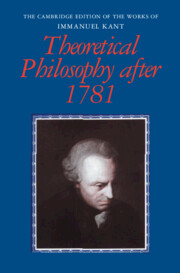Book contents
- Frontmatter
- Contents
- General editors' preface
- General introduction
- Prolegomena to any future metaphysics that will be able to come forward as science (1783)
- Metaphysical foundations of natural science (1786)
- On a discovery whereby any new critique of pure reason is to be made superfluous by an older one (1790)
- What real progress has metaphysics made in Germany since the time of Leibniz and Wolff? (1793/1804)
- On a recently prominent tone of superiority in philosophy (1796)
- Settlement of a mathematical dispute founded on misunderstanding (1796)
- Proclamation of the imminent conclusion of a treaty of perpetual peace in philosophy (1796)
- Editorial notes
- Glossary
- Index of names
- Index of subjects
General introduction
Published online by Cambridge University Press: 29 July 2009
- Frontmatter
- Contents
- General editors' preface
- General introduction
- Prolegomena to any future metaphysics that will be able to come forward as science (1783)
- Metaphysical foundations of natural science (1786)
- On a discovery whereby any new critique of pure reason is to be made superfluous by an older one (1790)
- What real progress has metaphysics made in Germany since the time of Leibniz and Wolff? (1793/1804)
- On a recently prominent tone of superiority in philosophy (1796)
- Settlement of a mathematical dispute founded on misunderstanding (1796)
- Proclamation of the imminent conclusion of a treaty of perpetual peace in philosophy (1796)
- Editorial notes
- Glossary
- Index of names
- Index of subjects
Summary
This volume, which is devoted to Kant's theoretical writings after 1781 (the time of the publication of the first edition of the Critique of Pure Reason), contains the following works: Prolegomena to Any Future Metaphysics (1783) [to be referred to as Prolegomena]; Metaphysical Foundations of Natural Science (1786) [to be referred to as Metaphysical Foundations]; On a Discovery whereby Any New Critique of Pure Reason Is to Be Made Superfluous by an Older One (1790) [to be referred to as On a Discovery]; What Real Progress Has Metaphysics Made in Germany since the Time of Leibniz and Wolff? (written during 1793–4, but only published after Kant's death in 1804) [to be referred to as Progress]; and the companion pieces: “On a Recently Prominent Tone of Superiority in Philosophy” and “Proclamation of the Imminent Conclusion of a Treaty of Perpetual Peace in Philosophy” (1796) [to be referred to as Tone and Proclamation, respectively].
Together these writings constitute only a small portion of Kant's total output after 1781, which includes the Groundwork to the Metaphysics of Morals (1785), the Critique of Practical Reason (1788), the Critique of Judgment (1790), Religion within the Boundaries of Mere Reason (1793), Perpetual Peace (1795), and the Metaphysics of Morals (1797), as well as many other writings (both substantive and occasional) dealing with religious, historical, political, and scientific issues.
- Type
- Chapter
- Information
- Theoretical Philosophy after 1781 , pp. 1 - 28Publisher: Cambridge University PressPrint publication year: 2002
- 1
- Cited by

